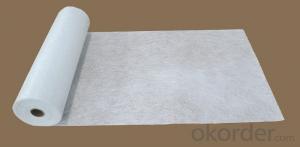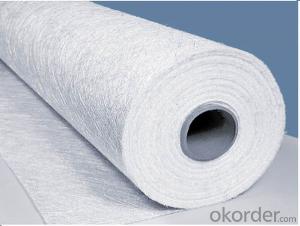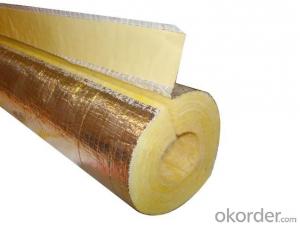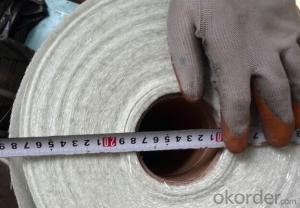E-glass Fiber Chopped Strand Mat Powder Bonded
- Loading Port:
- Shanghai
- Payment Terms:
- TT or LC
- Min Order Qty:
- 20000 kg
- Supply Capability:
- 200000 kg/month
OKorder Service Pledge
OKorder Financial Service
You Might Also Like
Brief Introduction
Chopped strand mat is made from chopped glass fibers, which are bonded with powder or emulsion binders. It can be used in hand lay-up process and continuous laminating process to produce FRP products, such as plates, lighting board, hull, bathtub, cooling towers, anti-corrosion materials, vehicles.
Characteristics
Good transparency for the laminates
Rapid wet out
Easy to remove air bubbles
Good dispersion and uniformity
High wet-strength retention
Good mechanical properties
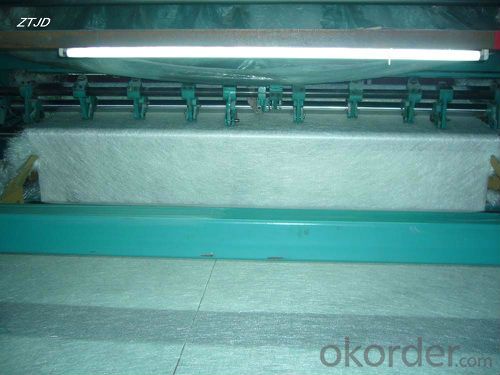
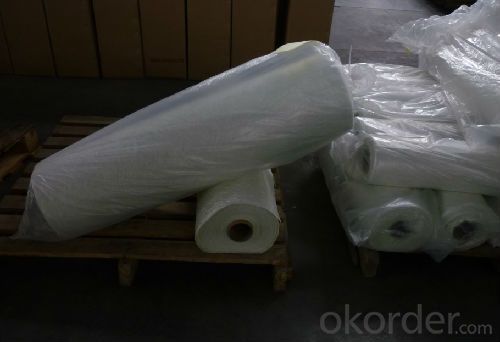
Specification:
Property | Unit | Specification | Standard |
Density | g/m2 | 80-900 | ISO 3374-2000 |
Fiber Chopped length | mm | 50 | |
Sizing | Silane | ||
Filament Diameter | um | 11-13 | ISO 1888-1996 |
Bonder Content—Powder (%) | % | 3.5 +/-1.2 | ISO 1887-1995 |
Moisture Content (%) | % | < 0.20 | ISO 3344-1997 |
Width (mm) | mm | 100-- 3200mm |
Packaging:
The packing is according customer’s requirement. Each roll with a plastic bag and carton, then pallet with shrink film wrapped.
Storage:
Unless otherwise specified, Chopped Strand Mat should be stored in a dry, cool and rain-proof area. It is recommended that the room temperature and humidity should be always maintained at 15℃~35℃ and 35%~65% respectively.
- Q:Can fiberglass mat tissue be used for automotive parts?
- Yes, fiberglass mat tissue can be used for automotive parts. Fiberglass mat tissue is a versatile material that provides strength, rigidity, and durability. It is commonly used in the automotive industry for various applications such as reinforcing panels, bumpers, hoods, and body parts. The fiberglass mat tissue is lightweight, making it suitable for reducing the overall weight of the vehicle and improving fuel efficiency. Additionally, it is resistant to corrosion, chemicals, and extreme temperature conditions, making it a reliable choice for automotive parts. The material's flexibility also allows for easy molding and shaping, enabling manufacturers to create complex designs and achieve desired aesthetics. Overall, fiberglass mat tissue is an excellent option for automotive parts due to its strength, durability, lightweight nature, and versatility.
- Q:Is fiberglass mat tissue resistant to oil and grease?
- Yes, fiberglass mat tissue is resistant to oil and grease.
- Q:Can fiberglass mat tissue be used for reinforcing fiberglass roofs?
- Indeed, fiberglass mat tissue is a suitable option for reinforcing fiberglass roofs. Comprised of delicate fibers that are joined together using a binder, fiberglass mat tissue is a thin and lightweight material. It is widely utilized as a reinforcement layer in fiberglass composites, providing them with robustness and endurance. Concerning fiberglass roofs, fiberglass mat tissue can be applied as an extra layer to enhance the roof's structural integrity. This additional layer aids in evenly distributing the load across the surface, thereby augmenting the roof's resistance against cracks, leaks, and other types of damage. Typically, fiberglass mat tissue is used alongside other fiberglass products, including resin and fiberglass cloth, to generate a sturdy composite material. The mat tissue is placed atop the fiberglass cloth prior to the application of resin. Subsequently, the resin saturates the mat tissue, establishing a bond between the layers. This combination results in a reinforced fiberglass roof that possesses heightened strength and durability. Moreover, fiberglass mat tissue can confer thermal insulation properties to the roof, contributing to temperature regulation and reduced energy consumption. It exhibits resistance against heat transfer, thereby preventing excessive heat accumulation within the building during hot weather. All in all, fiberglass mat tissue is an exceptional choice for reinforcing fiberglass roofs. By adding strength, durability, and thermal insulation properties to the roof, it becomes a reliable option for both residential and commercial buildings.
- Q:Can fiberglass mat tissue be used for insulation in research laboratories?
- Indeed, insulation in research laboratories can utilize fiberglass mat tissue. This material, widely employed for thermal and acoustic insulation, boasts exceptional insulating qualities. Its resistance to heat, moisture, and chemicals renders it ideal for laboratory environments. Moreover, fiberglass mat tissue's lightweight nature and effortless installation enable swift and efficient insulation in research laboratories. Its low thermal conductivity further aids in maintaining stable temperature conditions, guaranteeing optimal experiment conditions while curbing energy consumption. In conclusion, fiberglass mat tissue presents itself as a practical option for insulating research laboratories.
- Q:How does fiberglass mat tissue perform in terms of heat insulation?
- Fiberglass mat tissue performs well in terms of heat insulation due to its low thermal conductivity, which helps to minimize heat transfer. It acts as a barrier, preventing the escape of heat and keeping the surrounding environment insulated.
- Q:Can fiberglass mat tissue be used in wet environments?
- Yes, fiberglass mat tissue can be used in wet environments. It is resistant to water and can withstand exposure to moisture without losing its structural integrity.
- Q:Can fiberglass mat tissue be recycled?
- Yes, fiberglass mat tissue can be recycled. It is a common practice to recycle fiberglass waste, including fiberglass mat tissue, by breaking it down into smaller fibers and using it as a raw material in various industries such as insulation, construction, and automotive. Recycling fiberglass helps to reduce waste and conserves resources.
- Q:Can fiberglass mat tissue be used for making insulation panels?
- Indeed, insulation panels can be manufactured using fiberglass mat tissue. This lightweight and flexible material possesses remarkable thermal insulation characteristics. Typically, it is utilized as a reinforcing layer during the production process of insulation panels. By doing so, the mat tissue not only fortifies the panels, but also ensures efficient insulation against heat transfer. Moreover, fiberglass mat tissue exhibits resistance against moisture, mold, and mildew, rendering it highly suitable for insulation purposes.
- Q:Can fiberglass mat tissue be used for repairing fiberglass shower stalls?
- Yes, fiberglass mat tissue can be used for repairing fiberglass shower stalls. It is a commonly used material for reinforcing and repairing fiberglass surfaces, including shower stalls.
- Q:Is fiberglass mat tissue resistant to corrosion?
- Yes, fiberglass mat tissue is resistant to corrosion.
1. Manufacturer Overview |
|
|---|---|
| Location | |
| Year Established | |
| Annual Output Value | |
| Main Markets | |
| Company Certifications | |
2. Manufacturer Certificates |
|
|---|---|
| a) Certification Name | |
| Range | |
| Reference | |
| Validity Period | |
3. Manufacturer Capability |
|
|---|---|
| a)Trade Capacity | |
| Nearest Port | |
| Export Percentage | |
| No.of Employees in Trade Department | |
| Language Spoken: | |
| b)Factory Information | |
| Factory Size: | |
| No. of Production Lines | |
| Contract Manufacturing | |
| Product Price Range | |
Send your message to us
E-glass Fiber Chopped Strand Mat Powder Bonded
- Loading Port:
- Shanghai
- Payment Terms:
- TT or LC
- Min Order Qty:
- 20000 kg
- Supply Capability:
- 200000 kg/month
OKorder Service Pledge
OKorder Financial Service
Similar products
New products
Hot products
Hot Searches
Related keywords
